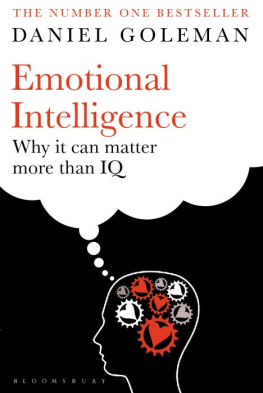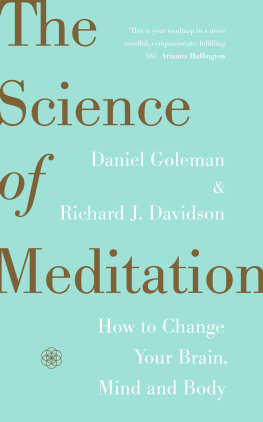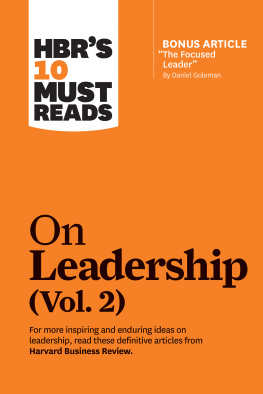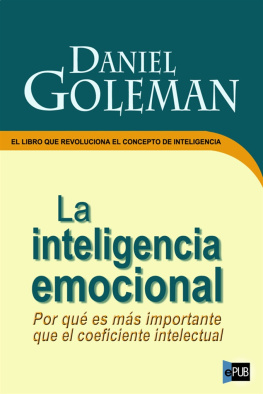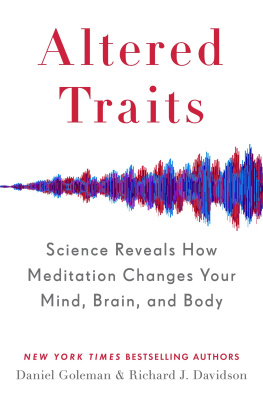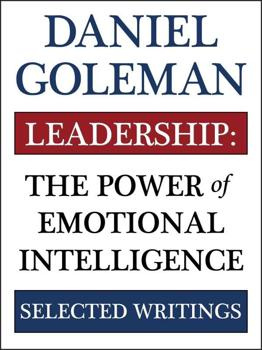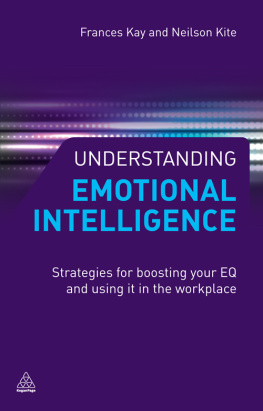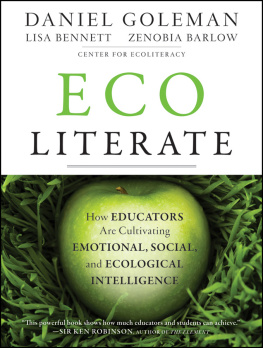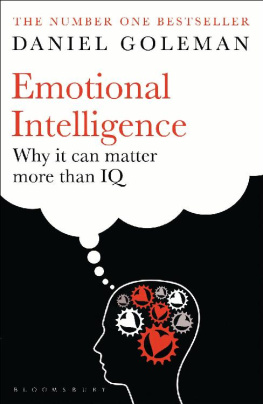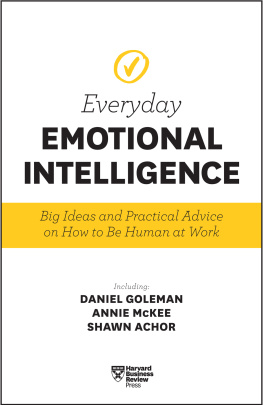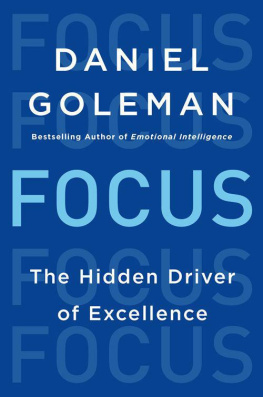WORKING WITH EMOTIONAL INTELLIGENCE
Must reading for all who bear the responsibility for the development of future leaders.
Ralph S. Larsen, Chairman and Chief Executive Officer, Johnson & Johnson
Daniel Goleman has done a wonderful job of capturing what I believe is a simple, powerful but perhaps less understood view of what determines leaders.
William B. Harrison, Jr., President and Chief Executive Officer, Chase Bank
Truly illuminating [and] critically important to todays workplace.
Publishers Weekly
EMOTIONAL INTELLIGENCE
Mr. Goleman is a teacher at ease with his subject mak[ing] lively connections between the wealth of new understandings and the riches of older wisdom about our affective lives.
The New York Times Book Review
Golemans highly readable and wide-ranging exploration of the best research available by modern psychologists and educators provides important insights into the true meaning of intelligence.
San Francisco Chronicle
Impressive in its scope and depth, staggering in its implications, Emotional Intelligence gives us an entirely new way of looking at the root causes of many of the ills of our families and our society.
Jon Kabat-Zinn, Ph.D., author of Wherever You Go, There You Are
A smart, adventurous book Goleman strikes a blow for both science and common sense.
The Philadelphia Inquirer
WORKING WITH EMOTIONAL INTELLIGENCE
A Bantam Book
PUBLISHING HISTORY
Bantam hardcover edition published October 1998
Bantam trade paperback edition published January 2000
Bantam trade paperback reissue edition / October 2006
Published by Bantam Dell
A Division of Random House, Inc.
New York, New York
All rights reserved.
Copyright 1998 by Daniel Goleman
Library of Congress Catalog Card Number: 98-18706
Bantam Books and the rooster colophon are registered trademarks of Random House, Inc.
eISBN: 978-0-553-90321-8
www.bantamdell.com
v3.1_r1
Contents
Beyond Expertise
The New Yardstick
T he rules for work are changing. Were being judged by a new yardstick: not just by how smart we are, or by our training and expertise, but also by how well we handle ourselves and each other. This yardstick is increasingly applied in choosing who will be hired and who will not, who will be let go and who retained, who passed over and who promoted.
The new rules predict who is most likely to become a star performer and who is most prone to derailing. And, no matter what field we work in currently, they measure the traits that are crucial to our marketability for future jobs.
These rules have little to do with what we were told was important in school; academic abilities are largely irrelevant to this standard. The new measure takes for granted having enough intellectual ability and technical know-how to do our jobs; it focuses instead on personal qualities, such as initiative and empathy, adaptability and persuasiveness.
This is no passing fad, nor just the management nostrum of the moment. The data that argue for taking it seriously are based on studies of tens of thousands of working people, in callings of every kind. The research distills with unprecedented precision which qualities mark a star performer. And it demonstrates which human abilities make up the greater part of the ingredients for excellence at workmost especially for leadership.
If you work in a large organization, even now you are probably being evaluated in terms of these capabilities, though you may not know it. If you are applying for a job, you are likely to be scrutinized through this lens, though, again, no one will tell you so explicitly. Whatever your job, understanding how to cultivate these capabilities can be essential for success in your career.
If you are part of a management team, you need to consider whether your organization fosters these competencies or discourages them. To the degree your organizational climate nourishes these competencies, your organization will be more effective and productive. You will maximize your groups intelligence, the synergistic interaction of every persons best talents.
If you work for a small organization or for yourself, your ability to perform at peak depends to a very great extent on your having these abilitiesthough almost certainly you were never taught them in school. Even so, your career will depend, to a greater or lesser extent, on how well you have mastered these capacities.
In a time with no guarantees of job security, when the very concept of a job is rapidly being replaced by portable skills, these are prime qualities that make and keep us employable. Talked about loosely for decades under a variety of names, from character and personality to soft skills and competence, there is at last a more precise understanding of these human talents, and a new name for them: emotional intelligence.
A Different Way of Being Smart
I had the lowest cumulative grade point average ever in my engineering school, the codirector of a consulting firm tells me. But when I joined the army and went to officer candidate school, I was number one in my classit was all about how you handle yourself, get along with people, work in teams, leadership. And thats what I find to be true in the world of work.
In other words, what matters is a different way of being smart. In my book Emotional Intelligence , my focus was primarily on education, though a short chapter dealt with implications for work and organizational life.
What caught me by utter surpriseand delighted mewas the flood of interest from the business community. Responding to a tidal wave of letters and faxes, e-mails and phone calls, requests to speak and consult, I found myself on a global odyssey, talking to thousands of people, from CEOs to secretaries, about what it means to bring emotional intelligence to work.
Over and over I heard what became a familiar litany. People like the high-performing business consultant with the low GPA told me they found emotional intelligence, not technical expertise or book learning, to be what mattered most for excellence. My book, they said, made it safe to speak up about the business costs of emotional ineptitude, and to question a narrow, expertise-is-all view of capabilities. They felt they now had a new way to think about what they wished for in their own workplaces.
People spoke with extraordinary candor about matters far beyond the reach of corporate PR radar. Many detailed what is not working (such tales of emotional ineptitude are retold here without revealing the persons or organizations identity). But many others told success stories, confirming the practical value of working with emotional intelligence.
And so began the two-year inquiry that has culminated in this book. The effort has woven together several professional strands from my own life. From the outset, Ive relied on the methods of journalism to delve into the facts and to narrate my conclusions. Ive also gone back to my professional roots as an academic psychologist, conducting an exhaustive review of the research that illuminates the place of emotional intelligence in high performance for individuals, teams, and organizations. And Ive performed or commissioned several new scientific analyses of data from hundreds of companies to establish a precise metric for quantifying the value of emotional intelligence.


